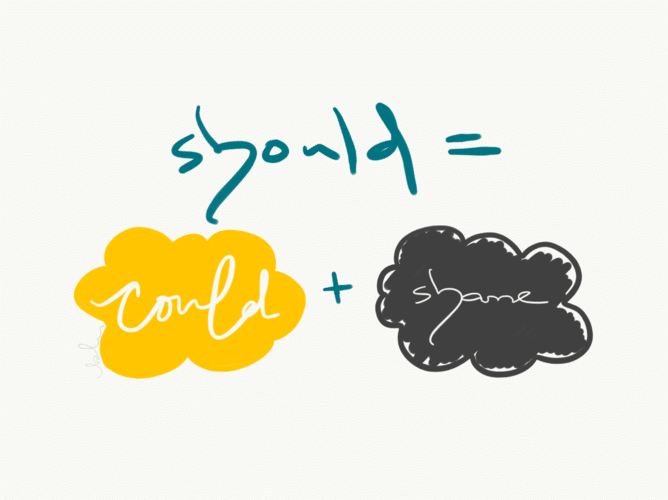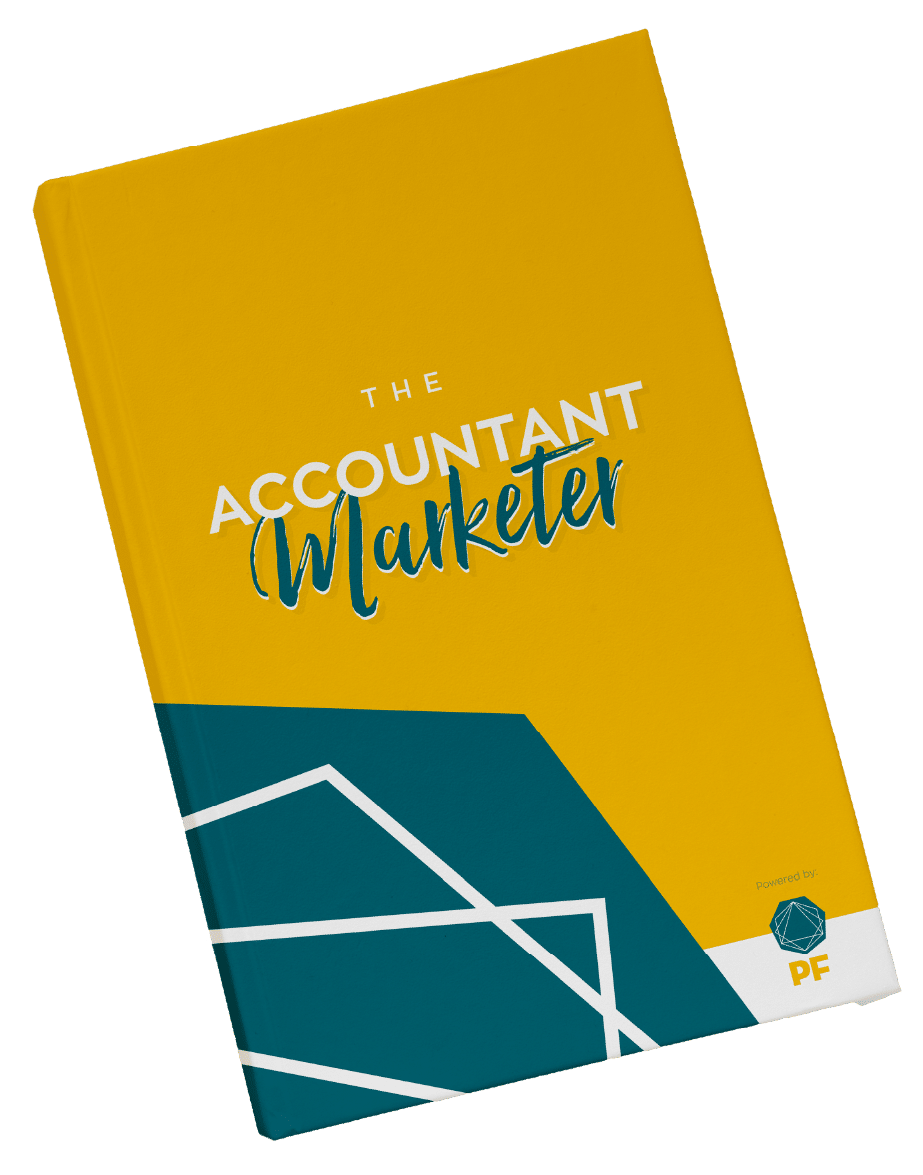I’ve got a personal vendetta against the word “should”.
It’s a shame word, a guilt word. And an unnecessary one.
I started this change over six years ago. I’d never loved the word, but there was a final kicker when my dad was terminal, and on hospice.
It had been a long road, as cancer often is: he’d tried all the medicines and tablets and even some of the research opportunities, and for several years every time I visited him in America I knew that time might be the last time I saw him. As it happened I was able to be there right at the end, as was my whole family. It was a hard time. We were tired and sad and emotions were swirling and blankness was hovering too. I arrived on a Thursday, and on Sunday morning my dad left this world and went on to the next one.
There’s very little I specifically remember from those three days. A lot of sitting around at the bedside, a lot of talking to the family and going places and coming back. Some laughter, some prayer, more talking. A good amount of silence.
I do distinctly remember one moment in the hospice room. Actually, the seven clear words a hospice nurse said to us.
Dad was lying quietly, maybe sleeping, maybe not. My sister and I were there, maybe talking, maybe not. My mum had been by my dad’s side endlessly – barely leaving for a few minutes at the most. For some reason she had been away with my sister for a few hours, and when she came back, the hospice nurse (his name was Steve) said Dad was moving to being unable to speak. My mum said something about how she should have been there, something she should have done or been doing.
I remember Steve literally stopping as he was moving to another room, and turning to look at my mother.
“No,” he said, “there are no shoulds in this room.”
That was all I remember.
He may have added something like, whatever is happening is happening as it needs to, and shoulding doesn’t change that. But that statement was so striking for me, my mum, and my sisters. What I found most amazing was (for a family who grew up “shoulding all over the place”, as the saying goes) the way we latched on to his reminder and repeated it to one another. Even an innocuous “Oh no, I should have brought the vegetables” would receive a rallying cry from multiple family members – “No shoulds!”
In that moment, and onward, it finally struck me the uselessness of the word “should”.
I should have gone there.
I should have said that.
It shouldn’t be like that.
They shouldn’t let that happen.
Even in instances of crime, or abuse, or literal wrongs in society, saying “should” still doesn’t help. Even if we’re saying it to reflect the fact that the world is broken, is hurting, needs healing and redemption and hope and binding up of wounds….it still doesn’t help in the moment of pain to add more pain on top of what’s already there. Because what can you do with a “should”, except hold it and let it rule you for a moment (or longer)?
You beat yourself up. You live in the regret. You settle more deeply into the anger without exploring it. You take all the blame and hold it to yourself.
And the shoulds take up all the space that the helpful, real emotions of hurt, sadness, anger, frustration, confusion, grief (or even happiness, hope, and inspiration) could be filling.
He shouldn’t have died.
She should never have been there.
I should go visit them.
We should be nicer.
Some of the things we “should” ourselves with are things we do really, honestly need to do. Be kind. Listen. Visit. Work. Sleep.
But the shoulding actually puts off dealing with it.
Instead of recognising we wish we’d done it, or want to, or make plans to actually do it next time….we should it away. And those around us support it because they, too, are shoulding their lives away.
As the owner of a creative agency serving accountants, our clients especially feel burdened, weighted, full of shoulds about marketing.
Accountants trained…as accountants. Not marketers. They’re told by the world (and if you’re an accountant you’ve told yourself) “you’re not creative”. (Spoiler alert: every human is creative, including accountants.) But good marketing relieves burdens. Which means no shoulds. The last thing in the world an accountant needs is to feel worse about something they aren’t quite sure how to do or if they’re doing well.
It’s a massive detriment to the things which help us grow:
Creativity
Curiosity
Openness
Discovery
Wondering
Hope
Shoulds destroy all of those. You aren’t going to open up to creativity when you’re staring at yourself and something (or everything) you did wrong. Curiosity doesn’t have a place with shoulds, because the should is absolutely rock solid in its confidence: I SHOULD HAVE. Fact. End of. I am right. There is no other option, there is no other way. Creativity and curiosity and discovery literally wilt in the face of shoulds.
“Guilt is arrogant. It means we have taken sides and are sure we are right.”
Matthew McConaughey, Greenlights
The should concept does apply to other things as well. The reflex of saying “sorry!”: not as a genuine, thoughtful, considered apology for a moral failing or a wrong done to someone, but a mere politeness and a reflex action. Taking blame because it’s there. “Oh, it’s probably my fault.” “No no, don’t feel bad.”
We apply it to things like grief. We say:
- I (or you) should be over this by now.
- It shouldn’t be taking this long.
- I (or you) shouldn’t be sad, because…
- I (or you) should move on.
It becomes something we take on to remove the space we are taking up: rather than filling it.
We need to retrain.
Simply removing the word “should” won’t work: we’ll simply find something else to replace it with, which means the same thing.
It’s like the story Jesus told about the evil spirit who was cast out of a person….thereby cleaning up the person’s soul-house and making it all fresh and new. The spirit comes back with 7 other evil spirits, even worse ones, and they all settle in there.
This is a challenge with changing any habit in life: and it’s multiplied in this case by the very nature of the should word. The moment we try to change it, we find ourselves saying “Oh, I shouldn’t say should!” and we’ve doubled down and invited in seven times as many shoulds.
I found it helpful to write down, and practice using, replacement words and phrases.
To share with others why I don’t use that word, and what it means, and encourage replacements if that makes sense to them, too.
In my agency PF, we consciously don’t use the word “should” – in writing or in speech – because our brand is about encouragement. Motivation. Helping accountants not only know, but believe, they are creative. They are doing good work. They are worth every penny of their value (and likely a whole lot more pennies than they’re charging).
Here are some of the replacements I use:
- Can
- Could
- Will
- Want to
- Wish I had
- Wonder if
I saw this quote from Jennifer Brookman this week and felt like it put into words what I’ve been mulling over for ages:
“The word should is like could plus shame”
Jennifer Brookman, LMFT
It will take a while to keep practicing, and that’s okay.
We don’t have to should our way into that, either. It’s just something you could do: without the bonus guilt which prevents us dealing with the very real feelings or situation or wonderings.
Keep the wondering, the creativity, the openness alive. Less sorrys, no shoulds.
Here’s to possibility.



